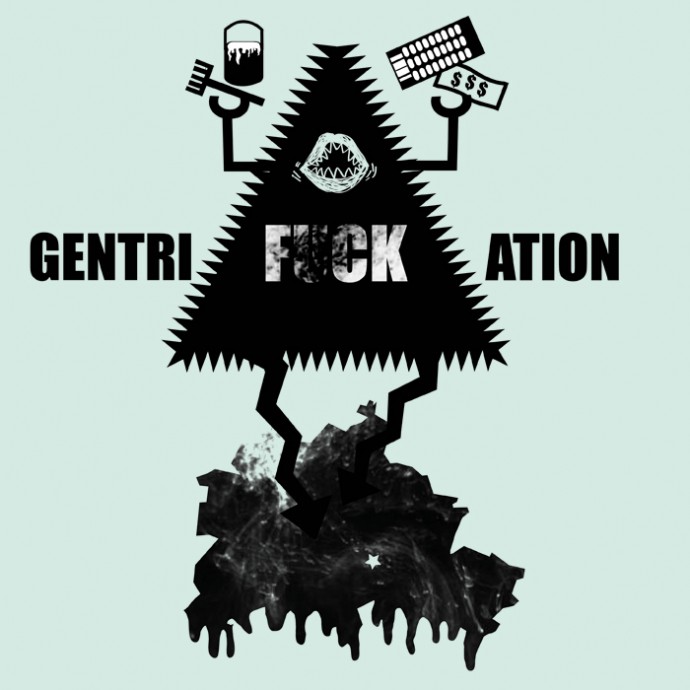Gentrification is slowly attacking Berlin after being almost done with London and Paris. In the German capital, it’s an army descending from Kreuzberg to Neukölln stealing leather sofas and expresso machines on the way. An English philosophy teacher explains how this process triggers a circle of poverty and hate in the city centre.
They took over Prenzlauer Berg. They took over Kreuzberg. Mitte fell into their purse a long time ago. Who are they? What do they want? Why are they taking over? Those questions are tough ones to answer. I perceive gentrification as a process of giving an area a face-lift – just without any previous warning. A neighbourhood that was socially deprived and nearly abandoned has in a few short years, filled with trendy bars and clubs, and now a coffee or a beer costs twice as much as it used to. Good for business you say?
Of course it is and that’s the main issue. The gentrification phenomenon is pushing workers out of the central city to give way for international students, artists and so on. The first step in the process is the broke student searching for a cheap rent. He or she will turn towards those former crappy districts in order to be able to live sparingly. One student attracts another; soon a district will be overflowing with people who want to move there. Here is the tricky part. Soon as the rentiers and other building owners realize this, they will increase their prices out of the blue to make the area “good to live in” again. By that expression, I mean good for the people with money, which is the goal of the investors. Their dream, as usual is to make the much money as possible.
The fall of the wall, Berlin becoming capital of Germany again, the nightlife of this city are well known all around Europe; those facts triggered this phenomenon nearly finished in Paris or London. The speculative investments along with the people taking advantage of prices is turning Berlin’s town centre into a museum of itself, a museum not even affordable for the people who live there. The only victims are the silent ones without any weapons to fight against the process. The workers are being squeezed between increasing rents and prices and their salaries do not increase in a similar fashion.
Landlords have, for example in Neukölln, flats and apartments that are uninhabitable, yet they still rent these for three of four hundreds euros a month – because they can. I witnessed this when trying to sublet a room in that very neighbourhood. The room I was in was small and dirty, and the subletter made ample profit to pay rent and his holidays through what I was paying. A lot of people are searching for accommodation so I had no choice but rent it.
Gentrification could be a healthy process, triggering a melting pot, a jambalaya of workers, students, families and artists from every part of the world. They could share their background and their culture but the opposite process is underway. Take Neukölln as an example, the Turkish community does not have the same lifestyle as the new trendy people coming into Berlin. A place for tea and shisha does not have the same customers as the new cool bar with Lou Reed and Jim Morrison hanging in the toilets. The time schedule does not match either, as can be seen in Neukölln, often you can witness a half-drunk western kid yelling at the Turkish späti (Late night shop in Berlin) because he does not have any alcohol.
This has resulted in two communities containing themselves, not sharing and not remotely interested in what the other has to offer, there is a split in the habits of consumption and a split in how the other is perceived. To make things worse, one community is being pushed out because of the increasing rents, whilst the other is gently settling in the city for short, middle or long term. It’s a real tragedy. This process encourages reactionary ghettoization and animosity is triggered towards the other community.
Is the mayor supposed to do something? Yes of course, but his only answer is “be happy that the money is flowing in your neighbourhood”, well the money is not for everybody, but then again, sometimes the authorities must be reminded that when you leave everything according to the invisible hand, the workers just get a couple of fingers up their arses.
The only solution that I see for the future would be to put a cap-on the rent, which seems almost impossible in today’s world, in a system where everything is economically connected, everything has a value and can be speculated on. Disconnecting the housing market in Berlin from the rest of the world would be difficult to achieve – but I say let’s change the system. For all those that want to come to Berlin and want to rent here – refuse the high prices, refuse to go in gentrified bars and areas, the power is in our hands. Let’s take it back!







